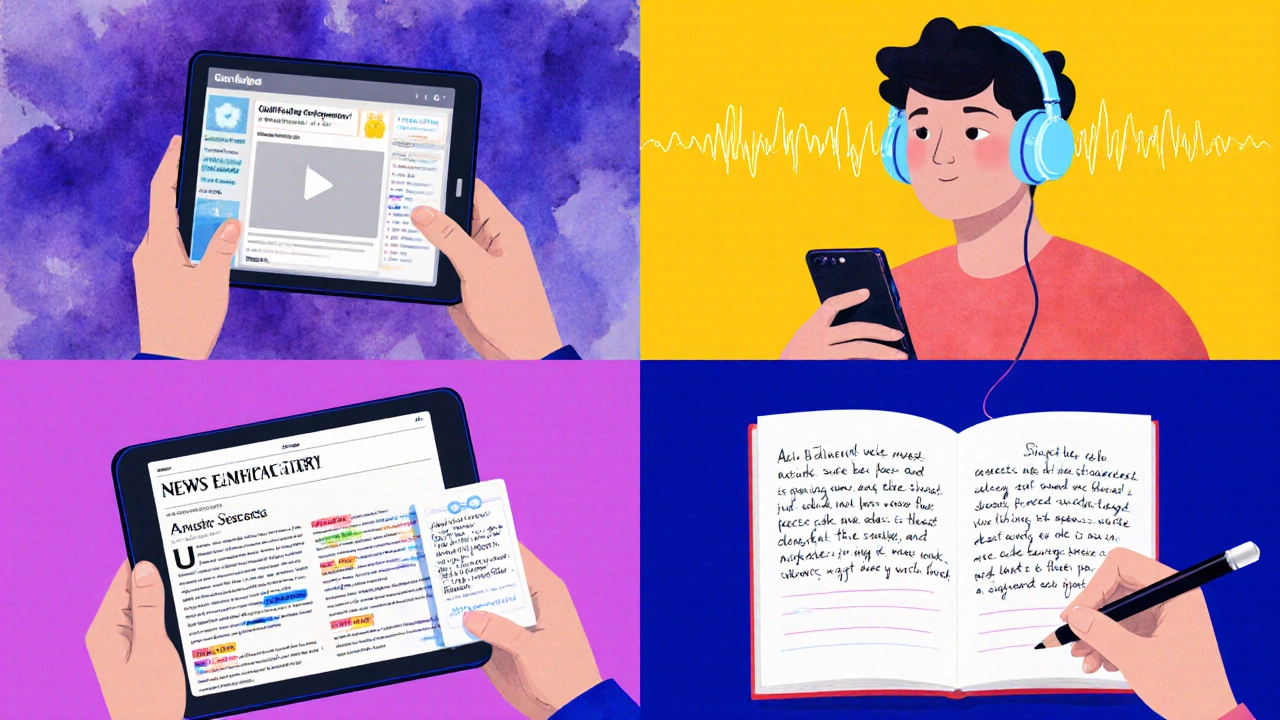Ever wonder if you can finally drop the 'I need a teacher' excuse and speak English with confidence? The short answer is yes-if you set up the right system and stay disciplined. This guide breaks down exactly what you need to do, which tools work best, and how to measure progress without ever stepping into a classroom.
Key Takeaways
- Fluency is a set of measurable skills, not a magical state.
- Self‑study can match a tutor’s results when you follow a structured plan.
- Balance listening, speaking, reading, and writing every week.
- Use free or low‑cost online resources, but add regular feedback loops.
- Track milestones and adjust the plan to keep motivation high.
What Does English fluency mean the ability to understand, speak, read, and write English with ease in everyday situations Actually Look Like?
Fluency isn’t just an accent or a big vocabulary list. It’s four skills working together:
- Understanding spoken English on TV, podcasts, or in conversation.
- Speaking clearly enough that native listeners understand you without repeated clarification.
- Reading articles, emails, or books with minimal dictionary look‑ups.
- Writing emails or messages that convey your ideas accurately.
When you can navigate all four without feeling stuck, you’ve reached a practical level of fluency.
Is Self‑studythe practice of learning without a formal teacher or classroom Really Enough?
Yes-provided you replace what a teacher would normally do: give you material, push you to use it, and correct your mistakes. self-study English can cover those bases if you choose the right resources and create feedback loops. Think of your learning path as a DIY language boot‑camp.

Designing a Personal Study Blueprint
Start with a simple schedule that fits your life. Even 30 minutes a day beats cramming one long session a week.
- Set clear, measurable goals. Example: “Listen to a 10‑minute podcast and write a 150‑word summary three times a week.”
- Break the week into skill blocks: two days listening, two days speaking, one day reading, one day writing.
- Pick a Vocabulary buildingsystem for learning new words through spaced repetition tool like Anki or Quizlet and add 5‑10 new words each day.
Write down the plan in a notebook or a digital app, and treat it like a workout routine-show up even when you don’t feel like it.
Core Skills: How to Practice Each One on Your Own
Listening
- Choose podcasts aimed at learners (e.g., "All Ears English" or "BBC Learning English"). Start with 5‑minute episodes, then double the length every two weeks.
- Use the Language immersiona technique that surrounds you with the target language in daily life trick: turn your phone, laptop, and TV subtitles to English.
Speaking
- Record yourself summarizing what you heard and compare it to native transcripts.
- Join free language‑exchange platforms like Tandem or HelloTalk. Even 10 minutes of real conversation each week builds confidence.
- Practice Pronunciation practicefocused drills on sounds, stress, and intonation using apps like ELSA Speak that give instant feedback.
Reading
- Select articles from sites like Medium or The Guardian at your level. Highlight unknown words, add them to your flashcards.
- Read short stories on Project Gutenberg; the built‑in dictionary feature in Kindle helps you stay in flow.
Writing
- Keep a daily journal in English. Aim for 5‑10 sentences, then use Grammarly or the free version of LanguageTool to spot errors.
- Post short answers on language‑learning forums (e.g., Reddit’s r/EnglishLearning) and request feedback.
Getting Real Feedback Without a Teacher
Feedback is the missing piece that many self‑learners overlook. Here are three cheap ways to get it:
- Language exchangea reciprocal conversation practice with a native speaker who wants to learn your language: schedule a 15‑minute video call, take turns correcting each other.
- Use AI‑powered tools (ChatGPT, DeepL Write) to rewrite your sentences and explain grammar choices.
- Upload short speaking clips to YouTube as unlisted videos and ask a friend or a tutor on Fiverr for a quick 5‑minute review.
Tracking Progress & Staying Motivated
Motivation fades if you can’t see results. Treat your learning like a game:
- Set weekly milestones (e.g., complete 3 podcasts, learn 30 new words, write a 200‑word blog post).
- Use a visual tracker-stickers on a calendar or a habit‑tracking app like Habitica.
- Reward yourself after hitting a goal: a movie night, a favorite snack, or a short trip.
Periodically reassess: take an online placement test (Cambridge English or EF SET) every two months to see real score gains.
Self‑Study vs. Guided Learning: Quick Comparison
| Aspect | Self‑Study | Tutor‑Guided |
|---|---|---|
| Cost | Often free or low‑cost (apps, podcasts) | Hourly fees, typically $20‑$50+ |
| Flexibility | Study anytime, anywhere | Fixed schedule, need appointments |
| Feedback Speed | Depends on tools or peers (hours‑to‑days) | Immediate correction during session |
| Structure | Self‑designed curriculum | Professional syllabus, progression |
| Accountability | Self‑driven; risk of dropping off | Teacher‑enforced milestones |
Both routes can lead to fluency. Choose the mix that matches your budget, time, and learning style. Many learners start solo, then add a tutor for a few months of intensive speaking practice.
Frequently Asked Questions
Can I reach native‑like pronunciation on my own?
Yes, but it takes focused Pronunciation practicetargeted drills on sounds, stress, and intonation and regular listening to native speech. Apps that give instant feedback and mimicking exercises accelerate progress.
How many hours per week are realistic for self‑study?
Consistency beats volume. 4‑6 hours spread across the week (30‑45minutes a day) builds habit and solid retention. If you can spare more, add extra speaking sessions or longer listening blocks.
What free resources are best for building vocabulary?
Anki flashcards (shared decks for IELTS or TOEFL), Quizlet’s "Learn" mode, and the "Word of the Day" feature on Merriam‑Webster are all excellent. Pair each new word with a sentence you record yourself saying.
Do I need a formal grammar book?
Not necessarily. Interactive sites like EnglishPage or the free Cambridge Grammar sections let you learn rules while doing exercises. Use a book only for quick reference.
How can I stay motivated during plateaus?
Switch up the format: try a new podcast genre, read a comic, or join a virtual book club. Seeing progress on a test or a checkpoint tracker reignites confidence.
